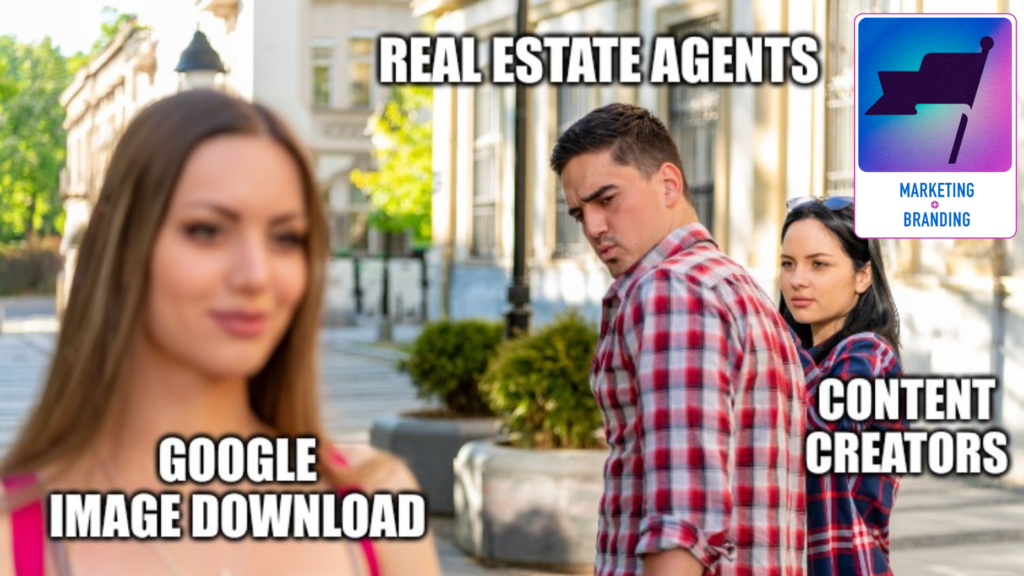 In March’s Marketing and Branding Month, we’ll go deep on agent branding and best practices for spending with Zillow, Realtor.com and more. Top CMOs of leading firms drop by to share their newest tactics, too. And to top off this theme month, Inman is debuting a brand new set of awards for branding and marketing leaders in the industry called Marketing All-Stars.
In March’s Marketing and Branding Month, we’ll go deep on agent branding and best practices for spending with Zillow, Realtor.com and more. Top CMOs of leading firms drop by to share their newest tactics, too. And to top off this theme month, Inman is debuting a brand new set of awards for branding and marketing leaders in the industry called Marketing All-Stars.
Think you recognize that photo at the top of this story? It’s an off-brand version of a photo that went wildly viral a few years ago. Known as the “Distracted Boyfriend” meme, the original has been posted and reposted millions of times online. You may have even meme-ified it yourself and shared it on your social media feed.
Did you know, however, that Distracted Boyfriend isn’t in the public domain? It’s a photograph by Antonio Guillem, and it’s licensed through the image company Shutterstock. Anyone wishing to use the photo for any purpose is supposed to pay for the privilege, yet it has been used again and again — because acquiring it is as simple as Googling and right-clicking.
You might think that taking a photo that turns into a famous meme would be a huge compliment for the photographer, resulting in fame and fortune. However, that’s far from the case.
According to Guillen, he’s seen very little revenue from Distracted Boyfriend (the real name of which is “Disloyal man walking with his girlfriend and looking amazed at another seductive girl”). What bothers him more, however, is how the use of the meme has resulted in disrespect aimed at the models, two of whom — the distracted boyfriend himself and his annoyed girlfriend — are close to him and work with him exclusively.
Why memes make such tempting marketing material
Of course, most people who share memes like Distracted Boyfriend don’t think of them as serious or disrespectful. Most people share them for fun or to be part of a popular online trend.
For real estate professionals who are looking for a cheap and easy way to get attention on their social media feeds, sharing the latest funny content is a no-brainer. Make your twist on the meme funny enough, and it becomes shareable through clients and colleagues who follow your feed.
The problem? Just as with Guillen’s photo, many of the images that end up becoming memes aren’t free, especially for commercial use. That could mean that your viral marketing might make you the subject of legal action, especially if the original creator decides that you’ve used their content in a way that is offensive.
That’s what happened in the case of Furie v. Infowars, LLC, 401 F. Supp. 3d 952, 971 (C.D. Cal. 2019). Artist Matt Furie brought a legal case for copyright infringement against Infowars for marketing materials that used his Pepe the Frog character, which had been appropriated as a meme by members of alt-right online communities.
Infowars ended up settling out of court with Furie, paying $15,000 in damages and destroying the unsold marketing materials. However, willful infringement can carry penalties of up to $150,000 if a content creator is willing to pursue damages through the courts.
According to Westlaw Today, the factors governing fair use include:
- the purpose and character of the use, including whether such use is of a commercial nature or is for nonprofit educational purposes;
- the nature of the copyrighted work;
- the amount and substantiality of the portion used in relation to the copyrighted work as a whole; and
- the effect of the use upon the potential market for or value of the copyrighted work.
One of the factors that keeps content creators from suing is the expense they incur to do so, which may sometimes exceed the potential damages. In an attempt to fix this issue, Congress passed the CASE Act, directing the Copyright Office to establish a tribunal of officers appointed by the Librarian of Congress. The process limits the potential financial awards but makes it easier and more affordable for creators to pursue damages.
What is your legal exposure?

Mindi Giftos
According to Mindi Giftos, a partner at Husch Blackwell and an attorney specializing in intellectual property matters, relying on Fair Use as a way to circumvent issues of copyright is probably a losing strategy.
From a purely legal perspective, you can’t use someone else’s work without their permission. The doctrine of Fair Use is never an affirmative right to use something. If you’re relying on Fair Use, you’re not going to really know if it’s fair use until a judge decides on that.
The reality is copyright law is very complicated and most people don’t understand it. When you add on the internet where people are sharing things it really muddies the water. You should never use somebody else’s work unless you have permission to do it.
According to Giftos, there are a lot of myths surrounding the use of online content. One of these is that as long as you provide attribution, you can use something you’ve pulled from an online source. This is simply not true.
Don’t think that these laws don’t matter just because you’re a small company. You certainly don’t want to be dealing with this on the backend. Especially in the commercial context, make sure that what you’re publishing is your own and that you’ve licensed any images you’re using.
There are a variety of different ways that content creators can reach out to a business owner, said Giftos. In some cases, you may be able to resolve the issue by saying, “I’ll take it down. I’m sorry, I didn’t know.” However, she said, a lot of large image providers have tags on their photographs and may send a link to have you pay for damages — sometimes costing thousands of dollars.
“It really depends,” Giftos said. “You could share something, and the owner doesn’t care at all, and you could have other people who are really aggressive in trying to monetize their work.”
So will you get sued for using a meme in your marketing?
Although it’s unlikely that your use of a meme will end up with you in court, especially if there are a large number of online shares and bigger financial fish to fry, it’s worth playing it safe by avoiding the use of content that’s not considered fair use.
Remember, legal precedent says that just because you add words to a photo or use it in unpaid, organic content shares, that doesn’t make it fair use. If you’re using it to promote your business, and you didn’t pay for that privilege, you could be found liable for damages. That’s not a risk worth taking.
Want to share that funny meme and call it your mood for the day? According to Giftos, the best practice would be to do it via text message or on your personal page. Don’t turn it into an ad for your real estate business.
Christy Murdock is a Realtor, freelance writer, coach and consultant and the owner of Writing Real Estate. She is also the creator of the online course Crafting the Property Description: The Step-by-Step Formula for Reluctant Real Estate Writers. Follow Writing Real Estate on Twitter, Instagram and YouTube.













